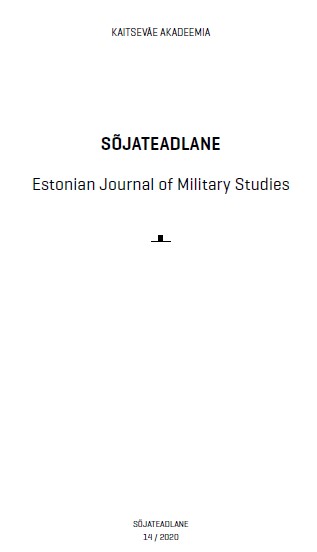OBJECTIFIED CULTURAL CAPITAL AND MILITARY SERVICE READINESS AMONG RESERVISTS OF THE ESTONIAN DEFENCE FORCES
OBJECTIFIED CULTURAL CAPITAL AND MILITARY SERVICE READINESS AMONG RESERVISTS OF THE ESTONIAN DEFENCE FORCES
Author(s): Taavi Laanepere, Kairi Kasearu, Liina-Mai ToodingSubject(s): Security and defense, Military policy, Behaviorism, Sociology of Culture
Published by: Kaitseväe Akadeemia (KVA)
Keywords: objectified cultural capital; military artefacts; reserve soldiers; military service readiness; Bourdieu;
Summary/Abstract: One of the primary objectives of mandatory conscript service is the generation and accumulation of positive cultural and social capital that would foster the service readiness of soldiers assigned to the reserve force. This study draws on Pierre Bourdieu’s concept of “objectified cultural capital” to highlight the role of military mementos and artefacts in fostering service readiness among reservists. The generation and accumulation of objectified cultural capital that is also positively related to other forms of capital and factors is one way of creating a solid foundation for long-lasting elements that make up a reservist’s military habitus. This study focuses on what types of military mementos are most effective for this purpose, and also how this objectified cultural capital is related to other forms of cultural capital (i.e., embodied cultural capital, and institutionalized cultural capital) acquired in the military field. The analysis is based on survey data collected from 1,248 reservists of the Estonian Defence Forces (EDF) during the 2019 military exercise Spring Storm. Based on our findings, the authors put forward a model for measuring the service readiness of reservists that aims to explain the interrelationships and impact of different types of cultural capital, while also factoring in the effect of prior personal experiences from military service. The results of this study indicate that the most influential military mementos that promote service readiness among reservists are personal photos and videos about interesting and exiting events, situations or activities. However, this type of objectified cultural capital seems to derive its positive effect from assemblage and interaction with other forms of cultural as well as social capital. Ultimately, our findings indicate that the strongest motivator affecting the service readiness of reservists is their satisfaction with the most recent military exercise, and that, in turn, depends on positive experiences related to unit cohesion and feelings of professionalism, supported by practical skills acquired in the course of military service.
Journal: Sõjateadlane
- Issue Year: 2020
- Issue No: 14
- Page Range: 39-64
- Page Count: 26
- Language: English

